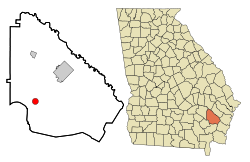Screven, Georgia
| Screven, Georgia | |
|---|---|
| City | |
 Location in Wayne County and the state of Georgia |
|
| Coordinates: 31°29′6″N 82°0′59″W / 31.48500°N 82.01639°WCoordinates: 31°29′6″N 82°0′59″W / 31.48500°N 82.01639°W | |
| Country | United States |
| State | Georgia |
| County | Wayne |
| Government | |
| • Mayor | Melvin Boyette |
| Area | |
| • Total | 2.2 sq mi (5.6 km2) |
| • Land | 2.2 sq mi (5.6 km2) |
| • Water | 0 sq mi (0 km2) |
| Elevation | 121 ft (37 m) |
| Population (2000) | |
| • Total | 702 |
| • Density | 319.1/sq mi (125.4/km2) |
| Time zone | Eastern (EST) (UTC-5) |
| • Summer (DST) | EDT (UTC-4) |
| ZIP code | 31560 |
| Area code(s) | 912 |
| FIPS code | 13-69448 |
| GNIS feature ID | 0332994 |
Screven is a city in Wayne County, Georgia, United States. The population was 702 at the 2000 census. Although it was a railroad town as early as 1847, it was not officially chartered until August 19, 1907.
In 1857 the Savannah, Albany and Gulf Railroad Company's line from Savannah, Georgia to Screven (then known as Station Seven) was completed when then trestle was built over the Altamaha River at Doctortown. Prior to this, the tracks connected the town to Thomasville, then a popular resort destination for wealthy Northerners and Europeans. The town was named for Dr. James Proctor Screven of the Atlantic and Gulf Railroad. After Dr. Screven's death in 1859, his son John Bryan Screven took over the railroad and continued its development. Both men served as mayor of Savannah. A section of the tracks just outside Screven on the Little Satilla is still known as the Abutment, the name it was given during the construction of the tracks.
The town was originally in the 4th land District of Appling County and moved into Wayne County when the county lines were redrawn after the American Civil War ended. The Confederate States Army had a training camp, Camp Harrison, in Screven for a short time in the Fall of 1860. The soldiers came by train to Screven.
Following the Civil War, Captain Christopher Columbus Grace, one of the Immortal 600, came to Screven and established himself in the turpentine, ginning and trade store business. In 1877, he erected a sawmill that spurned the community's growth. In 1880, he was a founding member of the Screven Methodist Episcopal Church, the first church established in the town of Screven. Other men of commerce came to join Captain Grace in the town of Screven. J. A. Hilton building the community's first brick store and operated a hardware store in later years. The J. H. Walker Company opened a mercantile business in 1876 and J. C. Hatcher opened a store in 1899. In the mid-1890s, the Royal family relocated to Screven to work with the Atlantic Coastline Railroad.
...
Wikipedia
